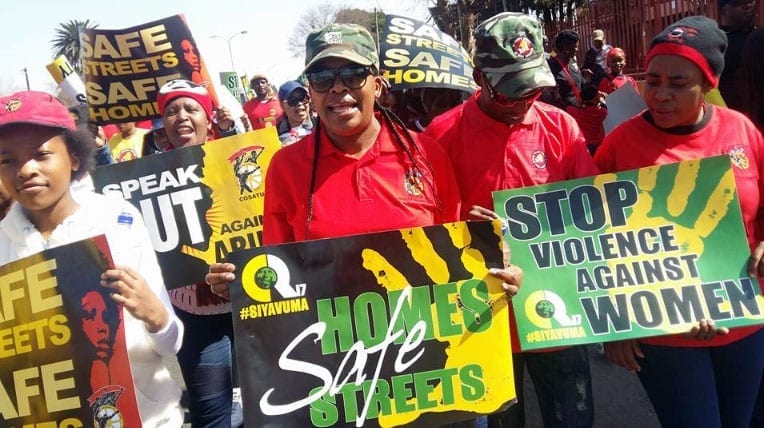
Aug 14, 2018
Gertrude Mtsweni and Rose Omamo, trade union leaders from Africa, recently joined hundreds of workers who participated with government and employer representatives in high-level deliberations on a draft global standard addressing gender-based violence at work.
Energized after long days of intense discussions during the International Labor Organization (ILO) conference in Geneva, the women are now working nonstop at the local and regional levels to educate union members about the draft convention and campaign to push their governments to ratify it after passage.
“All sectors—including clothing and textiles, food and service, transport—are involved in the campaign to end gender-based violence at work,” says Mtsweni, gender coordinator for the Congress of South African Trade Unions (COSATU). Mtsweni is spearheading 16 days of action beginning November 25 in which workers from 16 sectors represented by the federation develop messages highlighting aspects of gender-based violence at work. November 25 is International Day for the Elimination of Violence against Women.
COSATU was among unions joining the thousands of women and their allies who marched across South Africa August 1 to protest gender-based violence as part of the #TotalShutdown campaign. As a result, South Africa President Cyril Ramaphosa acknowledged that “South Africa has failed its women and their constitutional rights” and announced a national summit to address violence against children and women.
Moving Governments to Ratify the Convention
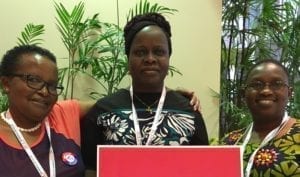
“Government should stand firm to say “No” to violence and harassment in the world of work”—Rose Omamo Credit: Solidarity Center/Tula Connell
In Kenya, Omamo is traveling around the country to educate engineers and workers in glass, metal and petroleum about the draft convention. Omamo is general secretary of the 11,000-member Amalgamated Union of Kenya Metal Workers, national chair of the Congress of Trade Unions–Kenya (COTU-K) Women’s Committee, and COTU-K executive board member.
She says workers are especially pleased that the draft convention, “Ending Violence and Harassment in the World of Work,” covers many groups, including women, men and young workers.
“Because violence in the workplace is rampant, they are saying this will help us have a firm stand to push government against violence at workplace, at home and in society.”
Omamo and Mtsweni also are working with the gender commission of the Organization of African Trade Union Unity (OATUU) to develop an effective message to urge their governments to ratify the convention after it is passed by the United Nations. Countries are not covered by a UN convention unless their governments ratify it and indicate they are committed to applying its provisions in national law and practice, and reporting on its application at regular intervals.
“One strong message we are putting across is that the government should stand firm to say “No” to violence and harassment in the world of work, and workers must be protected wherever they are,” says Omamo. The dozens of OATUU union affiliates are based in countries such as Angola, Burkina Faso, Ghana, Guinea, Rwanda, Tanzania and Togo, in addition to Kenya and South Africa.
Unions’ Campaign for Convention on Gender-Based Violence at Work
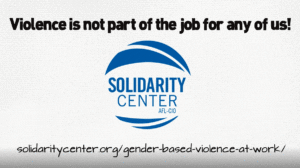
The Solidarity Center produced a video as part of its campaign for passage of a gender-based violence at work convention.
Momentum for an ILO convention covering gender-based violence at work follows years of advocacy by the global union movement, an effort led by the International Trade Union Confederation (ITUC).
Leading up to the most recent negotiations, Solidarity Center partners urged their unions, governments and employers to publicly support a binding ILO convention on violence and harassment at work that includes gender-based violence.
With Solidarity Center support, more than a dozen workers—from Brazil, Cambodia, Gambia, Guatemala, Honduras, Indonesia, Kenya, Mexico, Morocco, Nigeria, Palestine, South Africa, Swaziland, Tunisia and Zimbabwe—participated in the ILO conference. Several took lead roles in the negotiations as part of the workers’ group, including Omamo, who ensured gender-based violence remained the focus of discussions.
“The workers were very strong in negotiations, very specific on what they want,” says Omamo. “They took a very firm stand on the areas they felt that were good for workers.”
Elsewhere, union members from Ghana, Liberia, Sierra Leone and Turkey joined their sisters from across Nigeria in a weeklong training on the ILO draft convention, sponsored by the National Women Commission’s of the Nigerian Labor Congress (NLC).
And in Honduras, Solidarity Center staff organized a meeting of representatives from unions, government and business to garner support for a global standard inclusive of gender-based violence and to advocate for a law on sexual harassment at work.
The ILO in recent days released an updated version of the draft convention that reflects the discussions this spring, and will hold follow-up meetings throughout the fall. The organization will issue a second questionnaire for unions, governments and business to solicit further input on the convention (the results of the first questionnaire were incorporated in a draft last spring), and final discussion will take place at the next full ILO conference next May.
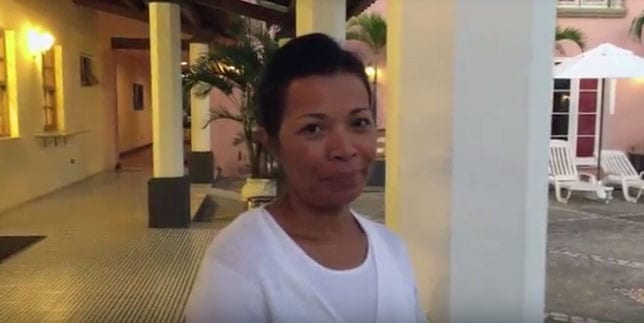
Aug 9, 2018
I am Marie Constant, I am from Madagascar. I have worked as a domestic worker in Lebanon since 1997. I work for one person only. The work is difficult, especially when we receive guests as we don’t have choice but stay up late working until the guests leave which is usually around midnight or sometimes around 1 a.m.
In general, the domestic workers don’t have a choice as they need to work from morning until evening with no specific break time and no holidays. And because of these rights abuse, we decided to form a union to defend our rights. Also, the fact that most domestic workers don’t have the right to weekly leave, we try to reach out to all the domestic workers women in most of the regions to educate them about their rights.
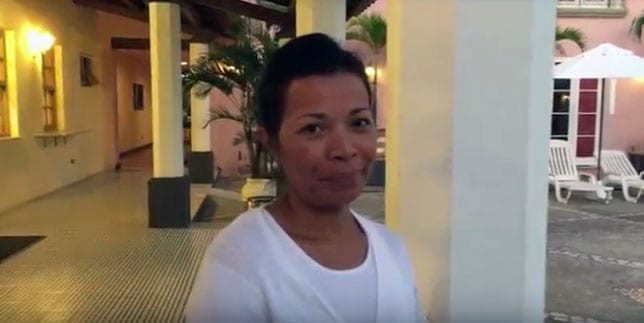
Aug 9, 2018
Marie Constant has worked as a domestic worker in Lebanon since 1997. Originally from Madagascar, Constant has been fortunate to have a good employer. But most migrant domestic workers are not so lucky.
“In general, domestic workers [must] work from morning until evening with no specific break time and no holidays,” she says, speaking in French through a translator. “When we receive guests, we don’t have choice but to stay up late working until the guests leave, which is usually around midnight or sometimes around 1 a.m. Most domestic workers don’t have the right for the weekly leave.”
“And because of these rights abuse, we decided to form a union to defend our rights.”
(Constant discusses domestic workers and the struggle for rights on the job in this Workers Equality Forum video.)
‘We Are Advancing”
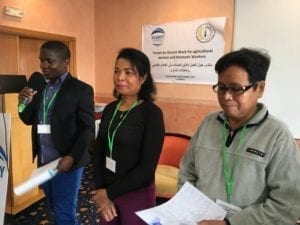
Marie Constant (center), joined other domestic worker rights advocates in Morocco last year for a Solidarity Center forum on decent work. Credit: Solidarity Center/Tula Connell
In 2015, she joined 300 domestic workers at the founding congress of the Domestic Workers Union in Lebanon, the first union of migrant domestic workers in the Arab region.
The union “is a source of great pride for us,” Constant says. Affiliated to the National Federation of Workers’ and Employees’ Unions in Lebanon (FENASOL), the union is yet to be officially recognized by Lebanon.
Much of Constant’s outreach involves informing domestic workers about the options for improving their wages and working conditions.
“We try to reach out to all the domestic workers women in most the regions in order to educate them about their rights.”
Despite the challenges, Constant recognizes domestic workers in Lebanon have taken big steps toward achieving dignity and decency on the job to which they and all workers are entitled, and she is optimistic about the future.
“We have a lot of hope. Even if we know we have a long way to go and that there are a lot of hurdles along the way, we are advancing, not regressing.”
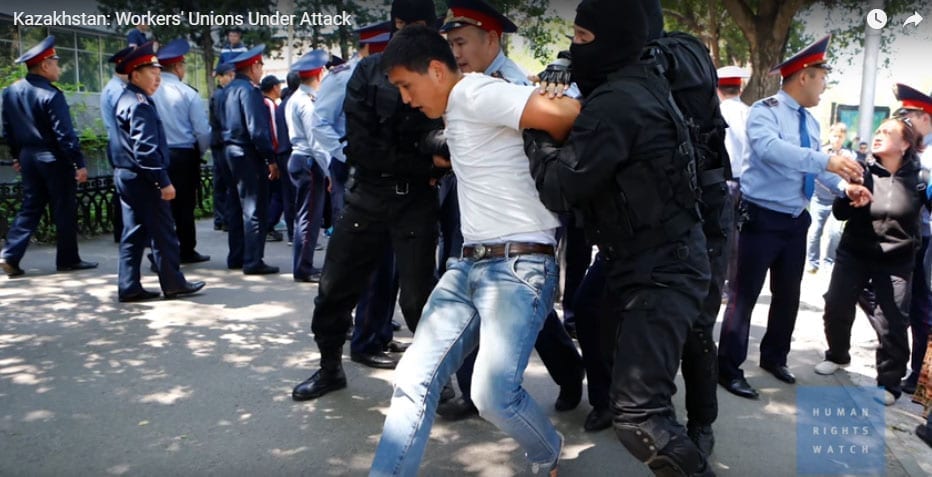
Aug 6, 2018
Human rights activists around the world celebrated the recent release from prison of two union leaders in Kazakhstan who were convicted of bogus criminal charges after participating in a peaceful workers’ protest against the forced closure of the country’s main independent union group, the Confederation of Independent Trade Unions of Kazakhstan (CITUK/KNPRK).
Yet the convictions of Amin Yeleusinov, Nurbek Kushakbayev and 30 other workers who took part in the rally have not been overturned, and trade union freedom there has been curtailed.
The anti-worker environment in Kazakhstan is not unique. Around the world, a pattern of attacks against freedom of assembly and collective bargaining is increasing even in countries with strong democracies within a broader clampdown on human rights and restrictions on civic space.
“Democratic organizing of workers is suppressed and all the democratic spaces to organize are shrinking. Thus, workers are unable to bargain collectively for their fair and just share and to sustain the present unjust economic order,” says Sanjiv Pandita, regional representative for Solidar Suisse in an email.
Worker rights often are the most frequently violated.
“In my opinion this is the biggest crisis of democracy we are facing.”
Murder, Death Threats and Repression
Broadly, more than 3.2 billion people live in countries in which “civic space” is either closed or repressed. Few countries—16 of 134 countries with verified data—are genuinely open, according to CIVICUS, a global civil society alliance that includes the Solidarity Center. One recent study concluded that since the end of 2017, one-third of the world’s population—2.5 billion people—have lived through “autocratization,” in which a leader or group of leaders began to limit democratic attributes and to rule more unilaterally.
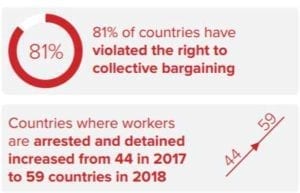
Credit: ITUC
Within this global crackdown on human rights, worker rights often are the most frequently violated. In most countries, unions provide the largest civil space for exercising fundamental human rights freedoms and building democratic societies.
The Global Rights Index 2018 compiled by the International Trade Union Confederation (ITUC) points to increased restrictions on the right to form unions: 65 percent of countries now exclude some workers from the right to establish or join a trade union, an increase from 60 percent in 2017.
The report finds the number of countries where workers were arrested and detained increased from 44 in 2016 to 59 in 2017. Last year, trade unionists were murdered in nine countries: Brazil, China, Colombia, Guatemala, Guinea, Mexico, Niger, Nigeria and Tanzania.
In 2017 alone, instances of repression or attacks against workers seeking to form unions, bargain collectively or rally for their rights ranged from harassment to murder.
Laws Protecting Worker Rights Not Followed
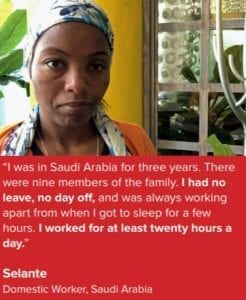
Saudi Arabia is among countries that bars migrant workers from forming or joining unions. Credit: ITUC
A 2016 report on rights to freedom of assembly and association in the workplace by a United Nations special rapporteur found that “unconstrained power, whether public or private in origin, is a critical threat to the protection of human rights, including workers’ rights to freedom of peaceful assembly and of association.”
The report detailed the many mechanisms by which worker rights are curtailed, including outright bans on all legitimate unions, such as those in Saudi Arabia and the United Arab Emirates. Countries also use laws to repress trade union and civil society freedom of association rights such as in Brazil, which passed laws that denied workers freedom of association, restricted free speech and used the military to suppress labor disputes.
Laws that restrict bargaining topics, including wages, hamper assembly and association rights because workers are more reluctant to risk organizing when potential gains are so few, the report says. Even in countries where the right to strike is not legally prohibited, governments attempt to justify restrictions by citing the need for public security, the threat of terrorism, national interest or economic crisis.
“Both trade unions and the right to strike are fundamental tools to achieving workers’ rights, as they provide mechanisms through which workers can stand up for their interests collectively, and engage with big business and government on a more equal footing,” according to the report. “The state is obligated to protect these rights for all workers.”
Many countries have ratified International Labor Organization (ILO) conventions that protect the freedom to form unions, strike and bargain collectively, and the notion that states create conditions that allow trade unionism among workers is implicit in the UN International Covenant on Economic, Social and Cultural Rights. Yet these international regulations and national laws with similar protections often are not followed.
Economic Inequality Parallels Shrinking Civic Space for Workers
Shrinking civic space for workers and their unions parallels a meteoric rise in global economic inequality. Seven out of 10 people live in a country where inequality is growing fast. The growing ranks of millionaires and billionaires now hold nearly half of global personal wealth, up from slightly less than 45 percent in 2012, according to a new report.
The concentration of wealth and power can combine to limit average citizens’ influence on politics and policy. Economic inequality and civic space are intricately connected. Tunisians still chant—and seek—“Bread, freedom, and social justice,” the slogan coined during the 2011 Arab uprising in which hundreds of thousands of people in countries throughout the region demanded economic justice and democratic freedom.
“The world has never been so unequal any time in modern history, and workers organizations and collective bargaining are the democratic control on capital that is being crushed systematically to maintain this order,” says Pandita.
Strengthening Workers’ Voice Strengthens Democracy
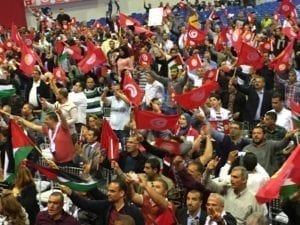
Tunisian workers and their unions were key to the country’s democratization. Credit: Solidarity Center/Tula Connell
Studies show that unequal economies reinforce distrust in government and threaten democracy. Addressing economic inequality means ensuring worker rights are strengthened. And strong worker rights are the underpinning to vibrant democracy.
“The freedoms of speech, assembly and association are the essence of any democracy,” says Barbara Unmüßig, president of the Heinrich Böll Foundation. “Their restriction poses a challenge to democratic governments and global cooperation.
“This issue must become part of foreign and development policy as well as human rights discussions, taken up by national parliaments and integrated globally into intergovernmental discussions and negotiations,” says Unmüßig.
As the report to the UN on freedom of assembly and association asserts: “Labor rights are human rights, and the ability to exercise those rights in the workplace is a prerequisite for workers to enjoy a broad range of other rights, whether economic, social, cultural, political or otherwise.”
“Democracy and human rights, like freedom of association, create equality in front of power, even the playing field and unleash the innovation of citizens that governments need to govern well,” says Solidarity Center Executive Director Shawna Bader-Blau.
Freedom of assembly, association, and speech are anchored in the 1948 Universal Declaration of Human Rights, and long established in international law and many national constitutions. By working to ensure workers have the freedom to exercise their rights, unions and the workers they represent, accompanied by human rights champions around the world, are the strongest and most effective solutions to the ongoing crisis of closing space choking democracies worldwide.
“In the past 50 years, so many major transitions to democracy have had social movements front and center,” says Bader-Blau.
“South African unions helped end apartheid. And for the role they played in transforming Tunisia, the labor movement there won the Nobel prize. Freedom of association is what revives and builds democracies, and gives us all a chance to promote economic and political rights simultaneously.”
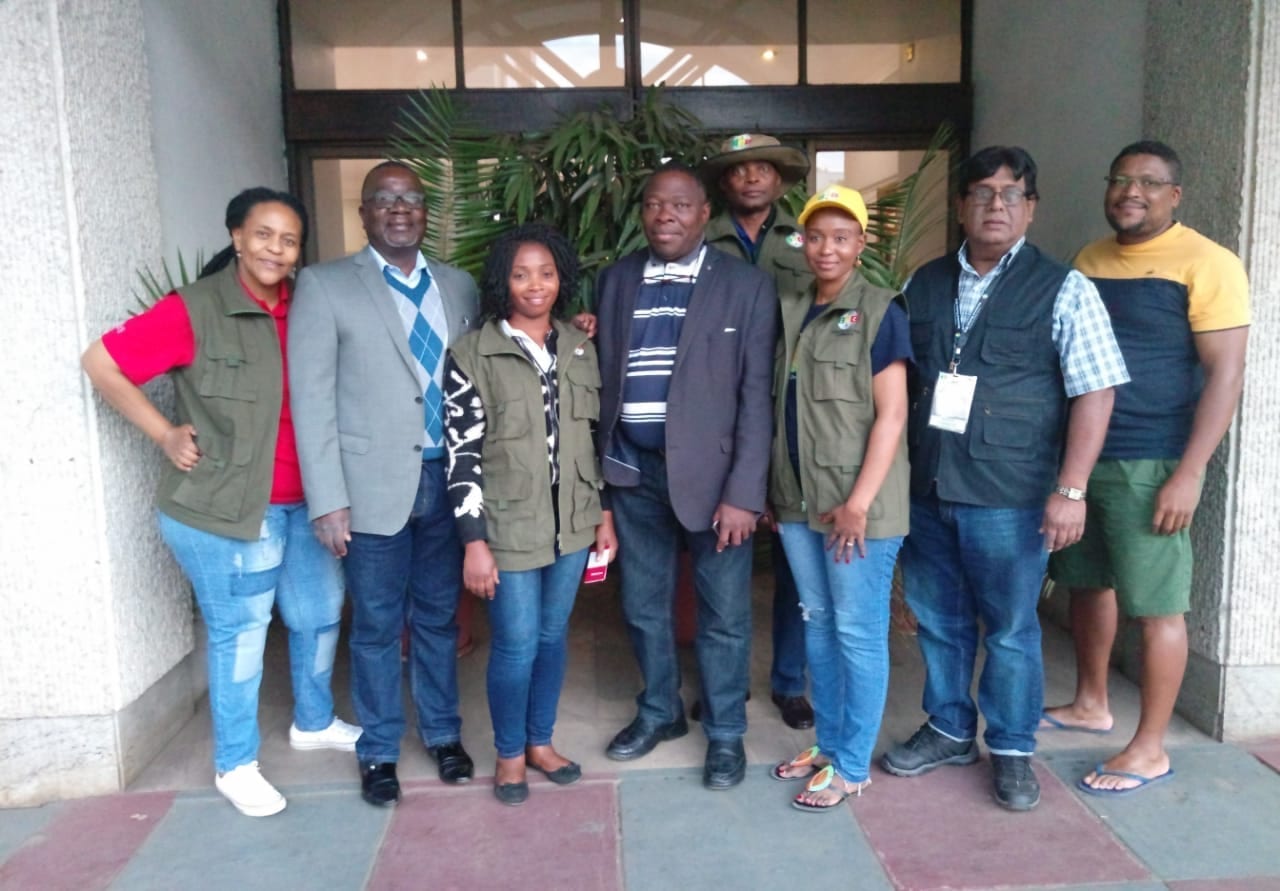
Aug 2, 2018
Workers’ Delegation Reports on Violence, Zimbabwe Election
Representatives of nine southern African trade union federations and the regional trade union organization, Southern Africa Coordination Council (SATUCC), reported a situation that went from calm on Monday to violent yesterday, as protesters vented anger at the delayed announcement of polling results in Harare, Zimbabwe’s capital.
As Zimbabweans lined up to choose a new president, the labor delegation observed a day unmarred by violence or intimidation. The situation deteriorated, however, as time wore on with no clear winner announced. Crowds gathered. According to news reports, six people were killed in clashes between opposition protesters and security forces. Bullets were fired into the third-floor offices of the country’s labor federation, the Zimbabwe Congress of Trade Unions (ZCTU).
The SATUCC election observation delegation—which had fanned out across Zimbabwe to observe the country’s historic election, the country’s first since the ruling ZANU-PF party ousted its 30-year president, Robert Mugabe—reported that polling day was peaceful. The 14-person delegation of trade union leaders representing federations in Botswana, Malawi, Mauritius, Mozambique, Namibia, Swaziland, Tanzania, Zambia and Zimbabwe traveled in six teams led by Solidarity Center staff members, who were also credentialed election observers, to polling places in several provinces and Harare to observe election processes and collect data for a joint report.
“We haven’t witnessed any difficulties and no cases of violence or injury in the polling stations we have visited,” said delegation member, Cosmas Mukuka, Zambia Congress of Trade Unions (ZCTU) secretary general, and deputy vice president, SATUCC, on Monday.
This election is Zimbabwe’s first since long-time ruler and head of the ZANU-PF party, Robert Mugabe, was removed by his own party and replaced by Emmerson Mnangagwa. Nelson Chamisa, leader of the main opposition party, the Movement for Democratic Change (MDC), was endorsed by the ZCTU. During previous elections, the government was accused of maintaining its hold on power through rigged elections and violence against supporters of the opposition party.
Full election results are not due until later this week. Both the ruling party and the main opposition party are declaring victory.
“Every Zimbabwean is hoping for better days to come,” said Peter Mutasa, president of Zimbabwe Congress of Trade Unions (ZCTU) and General Secretary of Zimbabwe Banks and Allied Workers Union prior to the election.











